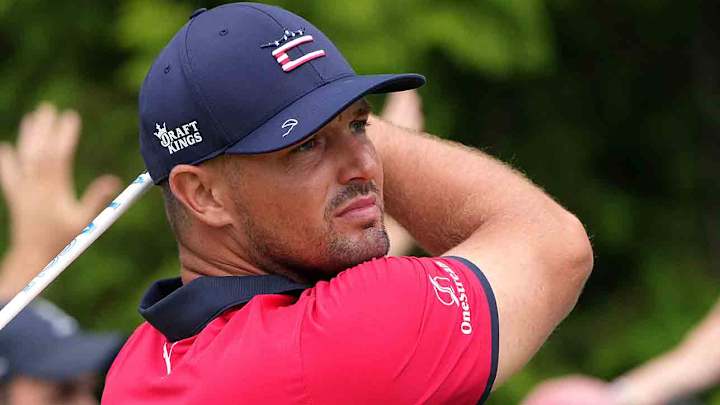With the PGA Tour Now Devoid of Black Hats, Broadcasts Are Bound to Suffer

The year began with a 24-year-old man lying motionless on an NFL field, a television audience of perhaps 25 million seated at the edge of life and death. Reality TV without a script, which is all sports really are, and this time, the potentially tragic tale of Damar Hamlin appears to have a happy ending.
Hamlin’s swiftly improving health testifies to the power of love and immense strength of the human spirit—raw reaction in universal form to a very intense matter. America’s largest pep rally in quite a while, a collective voice of hope expressed without a hint of dissent or political pushback.
It makes the biggest story in golf seem so silly, this farcical feud between the mighty empire and lecherous vampire. Between the defections and lawsuits, altered priorities and a weakened majority, the PGA Tour and LIV Golf have stepped into the ring without gloves or a clue as to what they’re fighting for. From there, the public has taken sides, almost all of it opposed to the brazen upstart because of its incorrigible funding, lousy manners and lack of competitive cause.
“They took all the a--holes,” Tour fringe player Harry Higgs told Golfweek’s Tim Schmitt last week. “They took all the villains, and that’s the problem. They took some of the ones who would have stories written about them maybe in a negative light, with kind of negative connotations. ... That’s kind of a driving force for people to read your story or turn their television on. I struggle with this.”
As divergent viewpoints go, Higgs’ doesn’t just take the cake—he bought the entire bakery. His assessment of pro golf as a popularity contest is a fascinating counterattack aimed not at the game’s gentlemanly demeanor, but its dirty little secret. “Most of my irritation is not with the print side,” he adds. “It’s with the airing of the golf tournament for four days. I get how hard it is to get 156-plus storylines in, but it just always feels like we take the easy way out, and a lot of this is the Tour’s fault, too.”
Don’t even contemplate the notion that a loose cannon fails to strike its targets. The villain factor has long been a welcome crucible at the game’s highest level, earning its first stripes when a fat kid named Jack Nicklaus took down Arnold Palmer on his own turf at the 1962 U.S. Open. Seve Ballesteros and Nick Faldo wore black hats with aplomb during crucial stretches of their careers, creating a dynamic that polarized rooting interests and lifted the competitive atmosphere to a level not unlike when Army meets Navy on the gridiron.
When it truly matters, we’re all in this together, but until then … Tiger Woods was the quintessential Darth Vader to many while thrashing his way to golf immortality, stepping on necks and crushing dreams to the point where it took years for the haters to finally acknowledge that his brilliance was beyond critical reproach.
Nice guys don’t always finish last. They’re more likely to make a couple of untimely bogeys and end up T7. Higgs is right in pointing out that a fair share of undesirables have fled the Tour, but as Patrick Reed has made perfectly clear, one man’s label is another man’s legal action. Golf fans are entitled to despise whoever they choose, but that hardly means we don’t want them around anymore. They always brought something to the party. Usually a bottle of vinegar to spike the fruit punch.
What made the departures of Brooks Koepka and Bryson DeChambeau so disappointing is that both had more history to play for. After spending most of his career serving as the neighborhood pinata, Sergio Garcia’s victory at the 2017 Masters became a feel-good story for the ages, although Sergio quickly reverted to behaving like a caustic teenager again. Who’s to say DeChambeau wouldn’t have grown up to become a five-time major champion and crowd favorite? A man can repent with a heartfelt lament—an act of sincerity Phil Mickelson never quite grasped on his way to becoming one of the 10 or 12 greatest golfers who ever lived.
Love and hate might best be categorized as the result of emotional reflex, and in sports, those spigots are easily managed. Hot and cold, always fluid. Higgs's depiction of televised golf as a see-no-evil, say-no-evil liability is a bold and highly perceptive observation. Very few tour pros would have the guts to denounce such a longtime standard, mainly because so few are open-minded enough to recognize the value of wandering off the beaten path.
Such a mentality might apply to the PGA Tour itself, especially in regard to its opinion of a low-down, no-good operation trying to steal its players and an ample portion of its thunder. Love conquers all. Even the most distasteful enemy.

A worldview optimist trapped inside a curmudgeon’s cocoon, John Hawkins began his journalism career with the Baltimore News American in 1983. The Washington Times hired him as a general assignment/features writer four years later, and by 1992, Hawkins was writing columns and covering the biggest sporting events on earth for the newspaper. Nirvana? Not quite. Repulsed by the idea of covering spoiled, virulent jocks for a living, Hawkins landed with Golf World magazine, where he spent 14 years covering the PGA Tour. In 2007, the Hawk began a seven-year relationship with Golf Channel, where he co-starred on the “Grey Goose 19th Hole” and became a regular contributor to the network's website. Hawkins also has worked for ESPN, Sports Illustrated, Golf Digest and Golf.com at various stages of his career. He and his family reside in southern Connecticut.